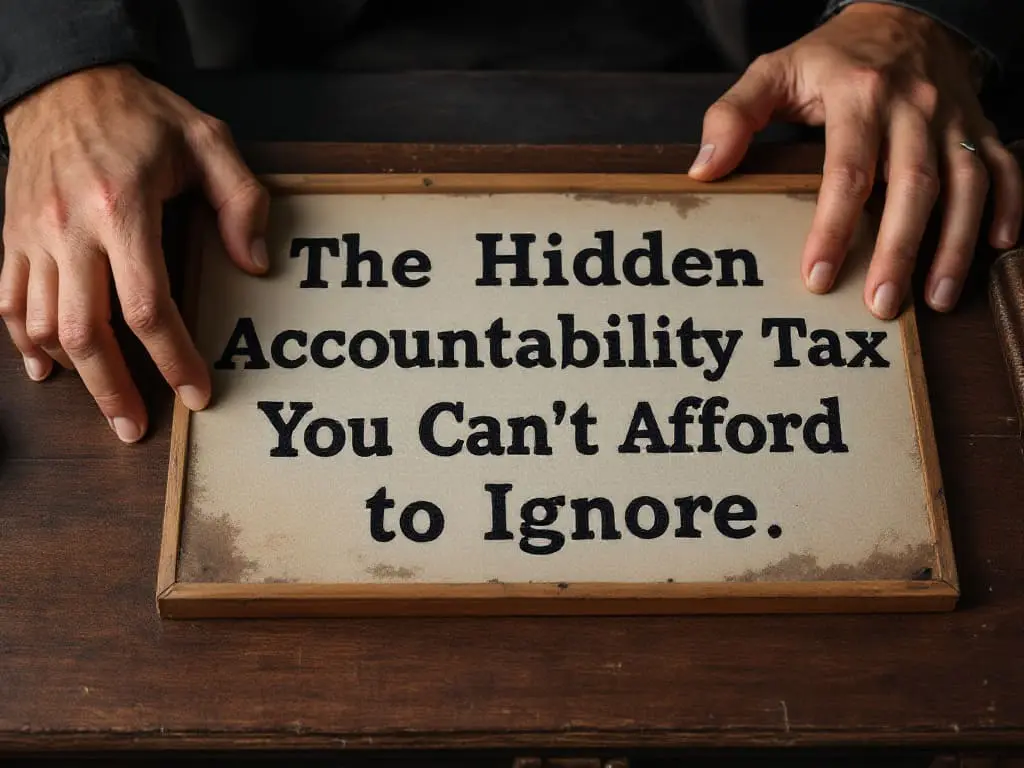Is Avoiding Responsibility Killing Your Success? The Hidden “Accountability Tax” You Can’t Afford to Ignore
Discover how dodging accountability costs you more than you think, impacting your career, relationships, and reputation. Learn to embrace responsibility and unlock your full potential!

The Accountability Tax: How Avoiding Responsibility Costs You More
Are you dodging responsibility? You might think you’re getting away with something, but avoiding accountability comes with a hidden price.
I call it the “Accountability Tax,” and it’s something we all pay, whether we realize it or not. Let’s dive into the costs of dodging responsibility and how embracing it can actually benefit you.
Key Takeaways:
- Avoiding accountability leads to long-term problems like damaged relationships, lost opportunities, and increased stress.
- Embracing accountability boosts efficiency, strengthens your reputation, and builds stronger relationships.
- Paying the “Accountability Tax” upfront through planning and communication saves you time and money in the long run.
Understanding the Accountability Tax
The “Accountability Tax” isn’t a literal tax you pay to the government.
It’s the collection of negative consequences that build up when we avoid taking responsibility for our actions or inactions.
It’s the price we pay for shifting blame, making excuses, and failing to own up to our mistakes.
The Hidden Costs of Lacking Accountability
Lacking accountability might seem like the easy way out in the short term. But trust me, I’ve seen firsthand how quickly the costs add up. Here are a few of the most common:
Career Stagnation:
When you don’t take ownership of your work, it’s harder to learn and grow.
Promotions pass you by because you’re not seen as reliable or someone who can handle increased responsibility.
Lost Trust:
Trust is the foundation of any good relationship, whether it’s with your boss, your colleagues, or your friends and family.
When you avoid accountability, you erode that trust, making it difficult to collaborate or even maintain positive relationships.
Personal Stress:
Avoiding responsibility creates a constant undercurrent of anxiety.
You’re always worried about being found out, or facing the consequences of your actions. This can lead to increased stress, burnout, and even mental health problems.
Research shows that chronic stress can significantly impact your overall well-being (Source: American Psychological Association).
Damaged Reputation:
Not holding yourself accountable can damage your image and reputation.
How Accountability Increases Success
Now, let’s flip the script. What happens when you embrace accountability? The benefits are significant and far-reaching.
- Increased Efficiency: When you take ownership of your work, you’re more likely to be proactive, organized, and efficient. You’re focused on finding solutions, not making excuses.
- Enhanced Reputation: Accountability builds trust and respect. You’re seen as someone who is reliable, responsible, and committed to doing the right thing.
- Stronger Relationships: When you own up to your mistakes and take responsibility for your actions, you build stronger, more authentic relationships. People appreciate your honesty and integrity.
The Price of Avoiding Accountability
Let’s look at some real-world examples of what can happen when accountability is lacking.
A Business Failure
Consider a tech startup that launched a product with critical bugs. Instead of immediately addressing the issues and taking responsibility, the leadership team blamed the developers, the marketing team, and even the customers for not understanding the product.
This lack of accountability led to a massive PR disaster, a loss of customer trust, and ultimately, the failure of the company. They paid the ultimate Accountability Tax.
An Individual’s Downfall
I remember a colleague of mine, Sarah, who consistently missed deadlines and blamed external factors.
She claimed her computer crashed, or that she had to deal with family emergencies. While some of these things might have been true, her constant excuses eroded trust with her team.
Eventually, she was passed over for promotions and ultimately left the company. Her career suffered significantly because of her lack of accountability.
Accountability in Action: Contrasting Scenarios
| Feature | Lack of Accountability | Embracing Accountability |
|---|---|---|
| Project Outcome | Delays, errors, blame shifting | On-time delivery, high-quality, problem-solving |
| Team Morale | Low trust, resentment, high turnover | High trust, collaboration, positive atmosphere |
| Personal Growth | Stagnation, defensiveness, missed opportunities | Continuous learning, resilience, growth |
| Reputation | Unreliable, untrustworthy, unprofessional | Reliable, trustworthy, professional |
Paying Your Accountability Tax Upfront
The good news is that you can choose to “pay” your Accountability Tax upfront, avoiding the steep costs later on. Here are some actionable ways to do that:
- Plan Ahead: Take the time to carefully plan your projects and tasks. Identify potential obstacles and develop contingency plans.
- Communicate Clearly: Communicate your expectations and deadlines clearly with everyone involved. Keep everyone informed of your progress and any challenges you’re facing.
- Own Your Mistakes: When you make a mistake, own up to it immediately. Don’t try to shift blame or make excuses. Apologize, take responsibility, and focus on finding a solution.
- Set Realistic Goals: Don’t overpromise or take on more than you can handle. Setting realistic goals will help you stay on track and avoid feeling overwhelmed.
- Seek Feedback: Ask for feedback from your colleagues, your boss, and your clients. Use this feedback to identify areas where you can improve and become more accountable.
- Document Everything: Keep a record of your work, decisions, and communications. It makes it easier to track progress, identify problems, and demonstrate accountability.
Final Thoughts
The Accountability Tax is a real and significant cost. While avoiding responsibility might seem appealing in the short term, the long-term consequences can be devastating.
If you embrace accountability, you can build trust, strengthen relationships, and achieve greater success in your career and your personal life.
Choose to pay your Accountability Tax upfront – the rewards are well worth the investment.





